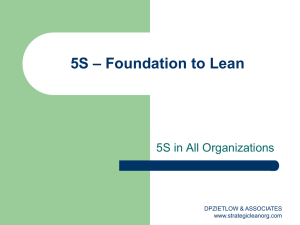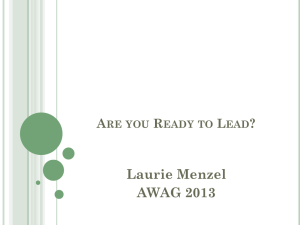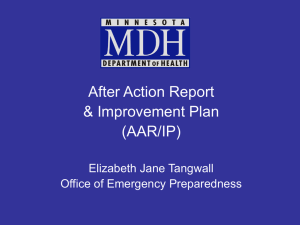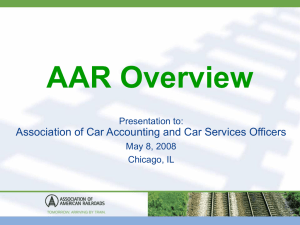Recent Developments in International Taxation
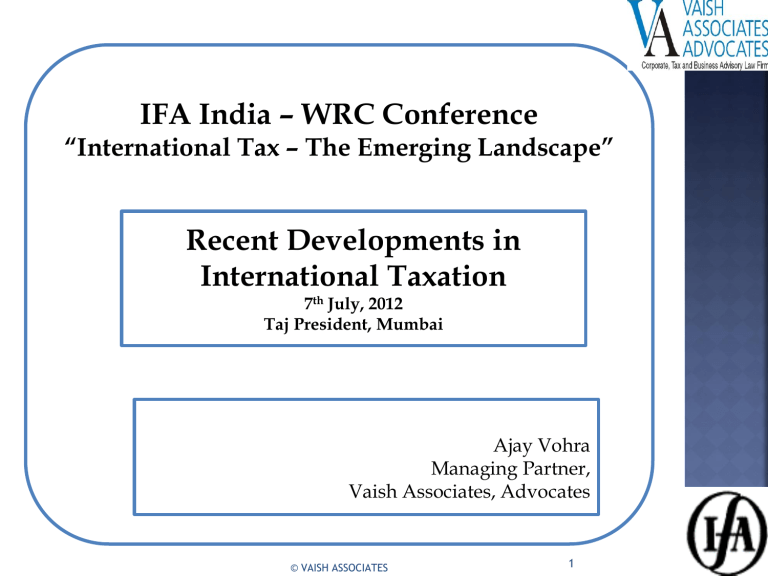
IFA India – WRC Conference
“International Tax – The Emerging Landscape”
Recent Developments in
International Taxation
7 th July, 2012
Taj President, Mumbai
Ajay Vohra
Managing Partner,
Vaish Associates, Advocates
© VAISH ASSOCIATES
1
A GENDA
Amendments made vide Finance Act, 2012 i.
Royalty ii. Tax Withholding iii. Tax Residence Certificates (TRC)
Recent decisions i.
Taxation of Turnkey Contracts ii. Taxation of FTS/FIS – Make Available iii. Tax issues in relation to deputation of expatriates
© VAISH ASSOCIATES 2
A MENDMENTS MADE VIDE
F INANCE A CT , 2012
ROYALTY
Section 9(i)(vi) has been amended retrospectively, from 01.06.1976, to clarify that
‘royalty’ will include the following:
transfer of all or any right for use or right to use a computer software
(including granting of a licence) irrespective of the medium through which such right is transferred.
consideration in respect of any right, property or information, whether or not
(a ) the possession or control of such right, property or information is with the payer;
(b) such right, property or information is used directly by the payer;
(c) the location of such right, property or information is in India .
3 © VAISH ASSOCIATES
A MENDMENTS MADE VIDE
F INANCE A CT , 2012
The term “process” has been defined to include transmission by satellite
(including up-linking, amplification, conversion for down-linking of any signal), cable, optic fibre or by any other similar technology, whether or not such process is secret.
Comments/Issues :
Consideration for use of computer software, in the absence of transfer of copyright therein, held not constituting royalty - Delhi High Court in Ericsson AB v. DIT: 204 Taxman 192 (Del).
Per Contra, Karnataka High Court in the case of CIT v. Samsung Electronics Co.
Ltd: 203 Taxmann 477 (Kar)
Mumbai Bench of the Tribunal in the case of DDIT v. Solid Works: ITA
No.3219/MUM/2010, after considering the decisions of the Delhi & Karnataka
High Court on the issue of software royalty, held that payment for standard/shrink wrapped software could not be said to be in the nature of royalty.
4 © VAISH ASSOCIATES
A MENDMENTS MADE VIDE
F INANCE A CT , 2012
The Delhi High Court in the case of Asia Satellite Telecommunications Co.
Ltd. vs DIT: 332 ITR 340, held that consideration for right to use transponder services couldnot be said to be royalty for use of ‘process’ under the Act.
The AAR in the case of Dell International Systems: 305 ITR 37 (AAR) had held that in order to treat payment as royalty, the payer must have ‘control’ or ‘possession’ over the “process” or equipment for which the consideration was paid.
The amendments are clearly meant to nullify the above and similar rulings.
CBDT has issued Circular/Instruction No. 500/111 12009-FTD-I (Pt.) dt.
29.05.2012, to clarify that retrospective amendments will not be applied to reopen assessments concluded under section 143(3) of the Act before
01.04.2012.
The CBDT has also issued Notification No.21/2012 dt. 13.06.2012 to clarify that there will not be cascading effect (194J – payment to resident) of the aforesaid amendments relating to software payments.
© VAISH ASSOCIATES 5
A MENDMENTS MADE VIDE
F INANCE A CT , 2012
Whether the aforesaid amendments affect the Treaty provisions?
Mumbai Bench of the Tribunal in the case of B4U International
Holdings Ltd. v. DCIT: ITA No. 3326/Mum/2006 held that the amendments do not impact the DTAA and consideration for use of transponder satellite does not constitute royalty under the Treaty provisions read with the aforesaid decisions.
Whether retrospective amendment to the definition of ‘royalty’ under section 9(1)(vi) of the Act fastens the liability of withholding tax on the payer of such sums with retrospective effect?
Lex non cogit ed impossibilia
Supdt. of Taxes, Dhubri and Ors.v: Onkarmal Nathmal Trust and
Ors: (1975) 1 SCC 766/ AIR 1975 SC 2065
Krishnaswamy S. Pd. v. Union of India [2006] 281 ITR 305
ITO v. LIC of India: [2001] 79 ITD 278
6 © VAISH ASSOCIATES
A MENDMENTS MADE VIDE
F INANCE A CT , 2012
TAX WITHHOLDING
Explanation 2 has been inserted in section 195(1) with retrospective effect from 01.04.1992
to clarify that obligation to withhold tax thereunder applies to all persons, resident or non-resident, whether or not the non-resident has:-
• a residence or place of business or business connection in India; or
• any other presence in any manner whatsoever in India.
Sub-section (7) has been inserted in section 195 to empower CBDT to specify class of persons or cases, where the payer responsible for making payment to non-resident or foreign companies, irrespective whether such sum is chargeable to tax or not, shall be required to make application to the assessing officer to determine appropriate proportion of the sum chargeable to tax in India .
© VAISH ASSOCIATES 7
A MENDMENTS MADE VIDE
F INANCE A CT , 2012
Comments/Issues :
The Supreme Court’s decision in the case of Vodafone International
Holdings B.V. vs. Union of India & Anr.: 341 ITR 1, gave an impression that tax withholding provisions under section 195 cannot possibly be applied to a foreign entity not having taxable presence in India. Justice
Radhakrishnan in his separate judgment, even went to the extent of holding that provisions of section 195 do not apply in respect of payment made by one non-resident to another non-resident. The insertion of
Explanation 2 seeks to put at rest the aforesaid controversy.
The Mumbai Bench of the Tribunal in the case of B4U International
Holdings Ltd. v. DCIT: ITA No. 3326/Mum/2006 held similarly, following Vodafone’s decision ,even after the amendment.
© VAISH ASSOCIATES 8
A MENDMENTS MADE VIDE
F INANCE A CT , 2012
If the assessing officer determines that tax is deductible at source but the non-resident payee does not agree, such payee would have to file a return in India to claim a refund.
It would lead to unnecessary compliance burden.
The amendment seeks to enlarge the ambit of section 195 and may have the effect of subjecting payments to tax withholding, which are not chargeable to tax in India.[ contrary to GE India Technology Centre
(P.) Ltd. v CIT: 327 ITR 456 (SC)]- leading to conflict between the charging provision s(section 4) and machinery provisions (section
195).
9 © VAISH ASSOCIATES
A MENDMENTS MADE VIDE
F INANCE A CT , 2012
TAX RESIDENCE CERTIFICATES
With effect from AY 2013-14, it is proposed to amend Section 90 and
Section 90A of the Act to make submission of Tax Residency Certificate, containing prescribed particulars, as a necessary condition for availing benefits under the DTAA.
Comments:
Going forward, the payers would be well-advised to seek TRC from the non-resident payees before applying Treaty rates, or considering any payment to such non-resident payees as exempt from tax under a Treaty; mere declaration by payees would not be sufficient.
It is also proposed to provide that the TRC shall have the prescribed particulars, which alone shall entitle the non-resident to Treaty benefits.
Therefore, if a TRC is issued by a foreign Government or authority, which does not contain prescribed particulars, it may not entitle the nonresident to claim Treaty benefits.
© VAISH ASSOCIATES 10
R ECENT D ECISIONS
TAXATION OF EPC CONTRACTS – IMPACT OF VODAFONE DECISION
EPC Contracts, whether turnkey or otherwise, are generally divided into two parts:
Offshore part:
Supply of equipment (from outside India) [‘Offshore supply’]
Engineering, drawings/designs relating to the equipment supplied, onshore installation activity [‘Offshore services’]
Onshore part:
Onshore services, i.e., installation of equipment or supervision of installation, transportation of equipment received from outside India, etc.
Onshore supply of materials through local contractors, equipment and accessories necessary for installation, trial runs etc.
© VAISH ASSOCIATES 11
R ECENT D ECISIONS
In Ishikawajima-Harima Heavy Industries: 288 ITR 408 (SC) , it was held that:
Income from onshore supply of goods and services was taxable in India and not the entire income from the composite contract. Despite the project being a turnkey project, applying the territorial nexus doctrine, only such part of the income, as was attributable to the operations carried out in India was to be taxed in India.
If the transfer of property in goods as well as the payment for such goods, takes place outside India, income from such transaction cannot be taxed in
India.
Argument that income from offshore supply and service is taxable in India since it is ‘intimately connected’ with the turnkey project was rejected by the Supreme Court and theory of apportionment applied.
To the same effect are the decisions of the Supreme Court in Hyundai
Heavy Industries and that of the Delhi High Court in LG Cables and several rulings of the AAR/Tribunal.
© VAISH ASSOCIATES 12
R ECENT D ECISIONS
RECENT AAR DECISIONS
Roxair Maximum Reservoir Performance WLL: AAR 977/2010
The taxpayer entered into a contract with ONGC for “services for supply, installation and commissioning of 36 manometer gauges”.
The taxpayer claimed that although contract was composite in nature, in view of the decisions of the Supreme Court in Ishikawajima-Harima Heavy Industries 288
ITR 408 (SC) and Hyundai Heavy Industries 291 ITR 482 (SC) and of the AAR in
Hyosung Corporation 314 ITR 343 (AAR), the income attributable to the supply of manometer gauges was not taxable in India because the title to the goods had passed outside India and the payment was received outside India.
Held
In view of the recent decision of the apex Court in Vodafone International Holdings
BV: 345 ITR 1 (SC) where it has been held that a transaction had to be “looked at” and not “looked through” and seen as a whole and not by adopting a “dissecting approach”, the earlier decision of the same court in Ishikawajima-Harima , wherein a dissecting approach had been by adopted by the Court was no longer good law .
See also Alstom Transport SA and other decisions in AAR/962/2010 and in
AAR/979/2010.
© VAISH ASSOCIATES 13
R ECENT D ECISIONS
Dongfang Electric Corporation: Kolkata Tribunal (ITA No.833/Kol./2011)
•
Dissecting approach is not to be applied, when the overall transaction is split in an unfair and unreasonable manner with a view to evade taxes.
•
However, the Tribunal doubted the view of the AAR, that dissecting approach cannot be applied at all, after vodafone decision.
Issues
Whether the observations of the SC in Vodafone’s case have any relevance for deciding taxation of turnkey contracts?
If the recent decisions of the AAR lay down the correct law, what is the relevance of
Article 7 of the DTAAs and Explanation (1) to section 9(1)(i) which deal with theory of apportionment?
What would be the impact of such decisions on the pricing of turnkey contracts since it would be advisable for non-resident contractors to factor in risk of taxation of the entire contract value in India?
© VAISH ASSOCIATES 14
R ECENT D ECISIONS
EPC CONTRACTS – FORMATION OF AOPs
Van Oord : 248 ITR 399 (AAR)
each of the two parties had agreed to bear its own loss or retain its own profit separately.
both the parties had agreed to execute the job together for better co-operation in their relationship with the Chennai Port Trust.
the intention was not to carry out any business in common - only a part of the job was to be done by VOACZ according to its technical skill and capability. – the other part of the contract was to be executed by HCC.
each party’s remuneration for their respective share of work was valued was identifiable.
Held
The association of VOACZ with HCC was not with the object of earning income but for co-ordination in executing the contract. HCC's work and income arising therefrom was quite separate and independent of VOACZ's work and income. If the costs incurred by HCC or VOACZ were more than their income, each party was to bear its loss without any adjustment from the other party. The association of
VOACZ with the HCC was undoubtedly for mutual benefit but such association did not make them a single assessable unit and liable to tax as an AOP
© VAISH ASSOCIATES 15
R ECENT D ECISIONS
In GeoConsult ZT GmbH: 304 ITR 283 (AAR), while distinguishing its earlier decision in the case of Van Oord (AAR), held that one of the most essential features in an AOP is the assumption of risks by one partner for and on behalf of the other . The AAR observed that while in the case of Van Oord, there was no control or connection between the work done by the parties, in the case of GeoConsult, in the case of insolvency of a member, the other members would take over its work and, therefore, an
AOP was formed.
In Hyosung Corporation: 314 ITR 343 (AAR) & Hyundai Rotem
Company: 323 ITR 277 (AAR), the earlier finding of the AAR that assumption of risks by one partner for and on behalf of the other would lead to formation of an AOP was negated by the AAR. The AAR further laid down the following tests for determining an AOP:
two or more persons
voluntary combinations
common purpose or common action
combination in joint enterprise ; and
some kind of scheme for common management
© VAISH ASSOCIATES 16
R ECENT D ECISIONS
RECENT AAR RULING
ABC in A.A.R. No.962 of 2010
Notwithstanding the fact that
the contract clearly identified the scope of work and obligations of the two Consortium members and the consideration payable thereof,
the expenses incurred by each member for their part of the work were to be exclusively borne by that member,
there was no sharing of costs or receipts between the two members inter se,
there was no sharing of assets employed by the two partners,
there was no sharing of profit or loss, and
there was no common employment of capital or resources, the AAR held the consortium to be constituting an AOP on the grounds that:
the contract awarded by contractee was turnkey in nature, and
the contract did not split the obligations between the ABC and its partner and that the consortium as a whole was liable to the contractee and not the members in their individual capacity
© VAISH ASSOCIATES 17
R ECENT D ECISIONS
T AXATION
OF FTS/FIS – ‘M
AKE
A
VAILABLE
’
Many Treaties have the same definition of “Fees for Technical
Services” as found in the Act. Some of the Treaties like Indo-US, Indo-
UK, Indo-Singapore, Indo-Netherlands, etc., however, define “fees for technical services” more restrictively , as under:
“(4) For the purpose of this Article, “fees for included services” means payments of any kind to any person in consideration for the rendering of any technical or consultancy services (including through the provision of services of technical or other personnel) if such services: a) are ancillary and subsidiary to the application or enjoyment of the right, property or information for which, a payment described in paragraph (3) is received; or b) make available technical knowledge, experience, skill, know-how, or process, or consist of the development and transfer of a technical plan or technical design”
© VAISH ASSOCIATES 18
R ECENT D ECISIONS
Before any service can be regarded as "technical service” under the aforesaid Treaties, the underlying assumption is that the same makes available technical knowledge/technology. The MOU appended to the
Indo-US DTAA provides that the term "fees for included services"
“excludes any service that does not make technology available to the person acquiring the service.” This means that the recipient of service must receive more than just expertise or advisory services; there must also be a transfer of technology.
Concept explained in Raymond Ltd. vs. DCIT: 86 ITD 791, observing as follows:
person receiving the technical service should be able to use it without recourse to the service provider in future
technical knowledge should remain with the person receiving the service after the service has come to an end
some sort of durability or permanency of the result of the rendering of the services is envisaged
© VAISH ASSOCIATES 19
R ECENT D ECISIONS
The AAR has in the cases of Perfetti Van Melle : AAR/869/2010 , Shell India :
A.A.R. No.833/2009 and Verizon : AAR/865/2010 not accepted the above proposition.
In Perfetti, it was held that the taxpayer made available its technical skills or knowhow to Perfetti India and equipped the Indian company with that knowledge or expertise to be used in future, independent of the taxpayer. The AAR refused to rely on the MOU to the India-US DTAA
In Perfetti, two factors impacted the ruling delievered against the applicant; a) the services were industry specific, (confectionery) and (b), too much stress had been laid on the word “Support” which showed that such services were ancillary to technical know-how provided.
In Verizon, the AAR held that benefit of the ‘make available’ clause is not available if the services are managerial in nature since the word ‘managerial’ is absent in the definitions of FTS/FIS under such DTAAs.
The Karnataka HC in DIT v. De Beers India Minerals Pvt. Ltd.: ITA Nos. 549-
551/2011 , has considered the aforesaid decisions of the AAR and held them not to be laying down the correct law. See also Delhi High Court in the case of DIT v. Guy
Carpenter & Co. Ltd.: ITA No. 202/2012
© VAISH ASSOCIATES 20
R ECENT D ECISIONS
TAX ISSUES IN RELATION TO DEPUTATION/SECONDMENT OF
EXPATRIATES
An expatriate is an immigrant, who leaves his own country to live in another country for a prolonged period.
Exercise of employment by an expatriate employee has tax consequences for the employee as well as the employer.
Rendering of service (Deputation) v.
Exercise of employment
(Secondment)
Legal employer vs. Economic employer
Payment made by the economic employer would partake the character of salary even though the economic employer may not be the legal employer of the deputed/seconded personnel and hence not FTS:
HCL Infosysystems Ltd. vs. DCIT : 76 TTJ 505 (Del) (affirmed by the Delhi High Court in 274 ITR 261)
© VAISH ASSOCIATES 21
R ECENT D ECISIONS
IDS Software Solutions India Pvt. Ltd. v. ITO: 122 TTJ 410 (Bang.)
Cholamandalam MS, In re: (2009) 178 Taxman 100 (AAR).
Tekmark Global Solutions LLC: 2010 38 SOT 7.
ITO vs Ariba Technologies (India) Private Limited.: ITA No. 616
(Bang.)/2011
ITO v. PQR India : [TS-258-ITAT-2012 (Bang.)]
Contrary view:
AT & S India Pvt. Ltd.: 287 ITR 421 (AAR)
Avion Systems Inc.: 1745/Mum/2009 – held to be FTS even after holding that the expatriates were ‘employees’ of the assessee.
Verizon Data Services India (P.) Ltd. (AAR): Reimbursement of salary constituted FIS, as it was for managerial services and not qualified by
‘make available’ clause. [Madras HC has sent the matter back for reconsideration to the AAR:WP No.14921 of 2011: dated 09.08.2011]
Centrica India Offsore Pvt. Ltd.: 249 CTR 11(AAR) – The AAR held that presence of employees of non-resident parent constituted service
PE under India-UK DTAA-held to be not rendering technical but only managerial services.
© VAISH ASSOCIATES 22
Any Query or Comment?
© VAISH ASSOCIATES 23
Thank You
© VAISH ASSOCIATES 24
Our offices
New Delhi
Flat No. 5,6 &7
10 Hailey Road
New Delhi-110001
Tel: 91 11 42492525
Fax: 91 11 23320484
E-mail: delhi@vaishlaw.com
1st Floor, Mohan Dev Bldg.
13, Tolstoy Marg
New Delhi - 110001, India
Phone: +91-11-4929 2525
Fax: +91-11-2332 0484
1105, Tolstoy House
11, Tolstoy Marg
New Delhi - 110001, India
Phone: +91-11-4925 2525
Fax: +91-11-4351 8415
Mumbai
106 Peninsula Centre
(Behind Piramal Chambers,
Income tax Office
Dr. S.S. Road, Parel
Mumbai-400012
Tel: 91 22 42134101
Fax: 91 22 42134102
E-mail: mumbai@vaishlaw.com
Bangalore
Unit No. 305, 3rd Floor,
Prestige Meridian-II, Building
No. 30, M.G. Road, Bengaluru
- 560001 (India)
Tel : 91 80 40903581/88/89
Fax: 91 80 40903584
E-mail: bangalore@vaishlaw.com
Gurgaon
803, Tower A,
Signature Tower
South City-I, NH-8
Gurgaon-122001
Tel: 91 124 4541000
Fax: 91 124 4541010
E-mail: gurgaon@vaishlaw.com
25 © VAISH ASSOCIATES
